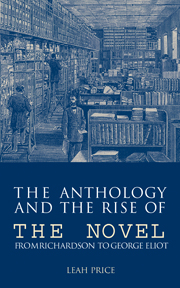Chapter 3 - George Eliot and the production of consumers
Published online by Cambridge University Press: 22 September 2009
Summary
In 1866, George Henry Lewes reflected that “it is a great pity that [Felix Holt] isn't quite ready for publication just in the thick of the great reform discussion so many good quotable ‘bits’ would be furnished to M.P.s.” The absence of those excerpts from the parliamentary record has been more than compensated since then by their ubiquity in other venues. Before her death, quotations from Eliot made their way not only into parliamentary debates, but into an anthology, onto a calendar, into four schoolbooks, onto an army officers' examination, into a sermon, into one reader's copy of the New Testament, and into various letters, and (as epigraphs) to the front of a socialist treatise and an abridgment of Boswell's Life of Johnson. In the years immediately following, her works were excerpted in a Zionist tract, provided chapter mottoes for at least one novel, and appeared in anthologies ranging from booklets for the pocket to albums for the sofa-table.
Readers' fondness for quoting Eliot can ultimately be traced to the structure of her own narratives, punctuated with epigraphs and lapidary generalizations. It owes a more specific debt to Mrs. Poyser – in the words of another character in Adam Bede, “one of those untaught wits that help to stock a country with proverbs” – whose persona defined Eliot from the first as a source of quotable wit and wisdom.
- Type
- Chapter
- Information
- The Anthology and the Rise of the NovelFrom Richardson to George Eliot, pp. 105 - 156Publisher: Cambridge University PressPrint publication year: 2000



